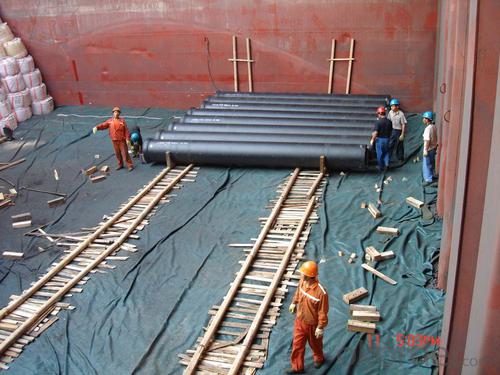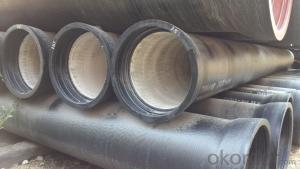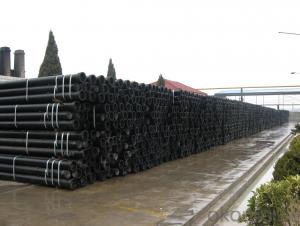Ductile Iron Pipe DN850
OKorder Service Pledge
Quality Product, Order Online Tracking, Timely Delivery
OKorder Financial Service
Credit Rating, Credit Services, Credit Purchasing
You Might Also Like
Specifications
Quick Details
| Place of Origin: | China (Mainland) | Brand Name: | CMAX | Model Number: | T type / K type / Flange type |
| Length: | 6m / 5.7m / Negotiable | Standard: | ISO2531 / EN545 / EN598 | Application: | Potable / Sewage water |
| Diameter: | DN80~DN2200 | Shape: | Round | Hardness: | 230 |
| Pipe Wall Thickness: | standard | Pull Strength: | 420 | Yield (≥ MPa): | 300 |
| Material: | Ductile Iron | Type: | Centrifugal ductile cast iron pipe | Certification: | ISO2531 / EN545 / EN598 |
| Outer Diameter: | 80-2200 | Thickness: | standard | Specification: | DN80~DN2200 |
| |
The advantages to the customer:
Trustworthy financial strength.
One-stop shopping.
Fast and efficient service.
Coordination of shipments from multiple plants.
Specialists of the overseas shipping process.
A more competitive price.
- Q: Ways of connecting ductile iron pipes
- In our country, the national standards stipulated annealing, centrifugal casting, water delivery with ductile iron, straight pipe, pipe fittings, aprons and other technical requirements, China's production of ductile iron pipe products must meet the current national standards.
- Q: How does ductile iron pipe perform in high-temperature environments?
- Ductile iron pipe performs well in high-temperature environments due to its superior strength and thermal resistance. It can withstand elevated temperatures without significant deformation or structural damage, making it a reliable choice for various applications requiring high-temperature resistance.
- Q: An urban infrastructure construction, water supply pipe is ductile iron pipe and PE pipe, thank you
- From the tightness and corrosion resistance, ductile pipe sealing better after installation, but also can improve the corrosion resistance of corrosion protection through a variety of means; from the hydraulic performance, because ductile pipe specifications generally refers to the inner diameter of PE pipe diameter specifications generally refers to the same specifications, because under the condition of ductile pipe can achieve more runoff large; from the installation and maintenance cost, ductile pipe have more favorable price.
- Q: Can ductile iron pipe be used for water treatment plant applications?
- Yes, ductile iron pipe can be used for water treatment plant applications. Ductile iron pipe is known for its durability, strength, and corrosion resistance, making it suitable for transporting and distributing treated water within a water treatment plant.
- Q: Are ductile iron pipes suitable for use in irrigation sprinkler systems?
- Yes, ductile iron pipes are suitable for use in irrigation sprinkler systems. Ductile iron pipes are known for their durability, strength, and corrosion resistance, making them an ideal choice for various applications, including irrigation systems. These pipes have a high tensile strength and can withstand high pressure and heavy loads, which is essential for maintaining a consistent water supply to sprinkler systems. Additionally, ductile iron pipes have a long lifespan, reducing the need for frequent maintenance and replacement, making them a cost-effective option for irrigation systems. Overall, ductile iron pipes are a reliable and suitable choice for use in irrigation sprinkler systems.
- Q: What is the expected cyclic fatigue life of ductile iron pipes?
- The expected cyclic fatigue life of ductile iron pipes can vary depending on several factors such as material composition, pipe design, loading conditions, and environmental factors. However, ductile iron pipes are generally known for their excellent fatigue resistance. Ductile iron pipes are designed to withstand cyclic loading, which is commonly experienced in water distribution and sewer systems due to fluctuating pressures and vibrations. These pipes have a unique microstructure that provides high strength and ductility, allowing them to resist the formation and growth of cracks under cyclic loading. Several studies and industry standards have provided estimates for the expected cyclic fatigue life of ductile iron pipes. The American Water Works Association (AWWA) C151 standard, for example, recommends a design life of 100 years for ductile iron pipes used in water distribution systems, indicating their long-term durability and fatigue resistance. Furthermore, research studies have shown that ductile iron pipes can withstand over 1 million cycles of loading without any signs of fatigue failure. The fatigue strength of ductile iron pipes can be further enhanced by using protective coatings or linings to minimize the effects of corrosion and abrasion. However, it is important to note that the expected cyclic fatigue life of ductile iron pipes can be influenced by various factors such as the quality of manufacturing, installation practices, and maintenance procedures. Regular inspections, proper handling, and adherence to recommended installation guidelines can help ensure the longevity and performance of ductile iron pipes. In summary, while the expected cyclic fatigue life of ductile iron pipes can vary depending on several factors, these pipes are generally known for their excellent fatigue resistance and can provide a long-term and reliable solution for water distribution and sewer systems.
- Q: Are there any specific standards or specifications for ductile iron pipes?
- Ductile iron pipes have specific standards and specifications that must be adhered to. The American Water Works Association (AWWA) and the International Organization for Standardization (ISO) are responsible for establishing the most commonly used standards for these pipes. AWWA has developed the AWWA C151 standard, which covers everything from design and manufacturing to testing, installation, and maintenance requirements for ductile iron pipes used in water and wastewater applications. This standard outlines the materials, dimensions, and mechanical properties of the pipes, as well as the necessary coatings and linings. Similarly, ISO has created the ISO 2531 standard, which provides guidelines for the design, manufacturing, testing, and installation of ductile iron pipes in water and wastewater systems. This standard addresses various aspects, including dimensions, mechanical properties, coatings, and linings. In addition to these well-known standards, there may be other regional or national standards that are specific to certain countries or regions. These standards typically align with the AWWA and ISO standards or may have additional requirements that are specific to local conditions or regulations. Compliance with these standards ensures that ductile iron pipes meet the required quality and performance standards. It also promotes the interoperability and compatibility of ductile iron pipes across different systems and countries, which in turn enables reliable and efficient water distribution and wastewater management.
- Q: How can the cast iron pipe be connected?
- Cast iron pipes are flanged and socket connected
- Q: Can ductile iron pipes be used for underground cable conduits?
- Yes, ductile iron pipes can be used for underground cable conduits. Ductile iron pipes are known for their strength, durability, and corrosion resistance, making them suitable for various applications, including underground cable conduits. Their ability to withstand heavy loads and external pressures makes them a reliable choice for protecting and housing underground cables.
- Q: Are ductile iron pipes suitable for sewage treatment plants?
- Yes, ductile iron pipes are suitable for sewage treatment plants. Ductile iron pipes are known for their durability, strength, and corrosion resistance, making them ideal for handling the corrosive and abrasive nature of sewage. They can withstand high pressure and are capable of accommodating heavy loads and ground movements, making them a reliable choice for sewage treatment facilities. Additionally, their smooth interior surface minimizes friction, reducing the risk of clogs and improving the flow of wastewater.
Send your message to us
Ductile Iron Pipe DN850
OKorder Service Pledge
Quality Product, Order Online Tracking, Timely Delivery
OKorder Financial Service
Credit Rating, Credit Services, Credit Purchasing
Similar products
Hot products
Hot Searches
Related keywords























